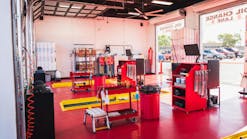Innovation fuels many industries, especially as the world continues to face a multitude of change and necessary adaptation. It is no surprise that this mindset also applies to the quick lube industry, regarding the various ways of approaching both services and their ultimate execution.
Navigating towards a fool-proof solution is never an easy task, but jumping in with a creative line of thinking can prove to be a unique way to equip for success.
For Costa Kapothanasis, President of Costa Oil 10 Minute Oil Change, this kind of opportunity presents itself in the form of innovative real estate endeavors. His strategy diverges from property that is thought to be more traditional, focusing instead on finding options that allow Costa Oil to better serve its franchisees while simultaneously eliminating some competitors and emerging better prepared for the future of the industry.
Build for Success
The process actually begins with the physical buildings involved by invoking a design concept called Costa Oil Kiosks. These are buildings that can be built on smaller lots and allow Costa Oil to have a lean operation focused on high volume.
“Right now, we are concentrating on building new buildings because we have been able to create a building that is affordable, opposed to the more common trend of these quick lube buildings being millions of dollars to build.” Kapothanasis shares with NOLN.
Given the compact size of these buildings, Kapothanasis has found that Costa Oil can approach real estate options that differ from what is traditional. He has done so by purchasing existing lots that previously housed gas stations.
Recently, he submitted applications to build new corporate stores on gas station lots through a blind auction purchase from Speedway/Circle K in Michigan. The way that Kapothanasis sees it, many of these convenience store-style businesses are moving out of properties like these, providing a business like Costa Oil with the chance to move in and find new successes. Overall, he sees this market as one with low competition and high inventory potential, due to this changing gas station structure.
“The gas station business has become one where, instead of having a 600 square foot convenience store where you grab a Red Bull and Cool Ranch Doritos and drive away, now all of the sudden they have these 5,000 square foot acre parcels,” Kapothanasis explains, “and those 0.23-and 0.27-acre lots are no longer big enough to really have the new model gas stations.”
This shift provides access to a surplus of real estate options at cheaper rates. It was a no-brainer for Kapothanasis to explore this more after transitioning two pilot locations from gas station to quick lube.
“I know that there are some challenges with remediating gas station sites sometimes,” Kapothanasis says. “If you’re able to do the leg work and find out what site works and do the due diligence, then there is a huge opportunity there.”
Ultimately, it is about more than opportunity. It is also about the outcome. Kapothanasis is using this creative line of real estate forward thinking to solidify Costa Oil as a stand out contender within the industry.
The opportunity to pursue real estate that is relatively untouched by other quick lubes gives Costa Oil an advantage. There is no threat of getting caught amidst a bidding war with other brands that utilize a traditional half-acre lot.
“We’re not competing with Popeye’s, we’re not competing with Raising Cane’s and Starbucks and all of these other established companies.” Kapothanasis says. “If you’re an emerging quick lube brand and you’re constantly having to battle with Rite Aid for a half-acre lot, they’re going to be able to pay more than you. So it’s important to make sure that you minimize that competition.”
Establish a Lasting Impact
Another important factor for Kapothanasis is having the same efficient operation ability as other quick lubes without the addition of a massive operating expense. He always keeps his franchisees front-of-mind and he knew he wanted to incorporate these ideas while keeping some of the cost down, especially considering that most quick lube operators lease space instead of owning.
“Every day that I come into the office, my goal is to figure out: ‘How do I benefit my franchisees the most?’” Kapothanasis says. “A lot of it has to do with managing that overhead. If we can mitigate those risks by having a less expensive real estate prospect, that ultimately just means more money in their pocket instead of going to a landlord.”
His willingness to think outside of the box has allowed Kapothanasis to fill a need and solve multiple issues at once, including some that have not even presented themselves fully yet.
“There is going to be a model that is left behind when electric vehicles more meaningfully penetrate the ecosystem.” Kapothanasis says of the future. “We think that our model is going to be what is left behind. For us, to scale is super important because the timing of it has to work as well.”
Kapothanasis’ case is a persuasive lesson in implementing innovation because when it comes to timing, there is no better time than the present. Creating meaningful strategy towards impactful adaptation now is how quick lubes can ensure prosperity into the future.






